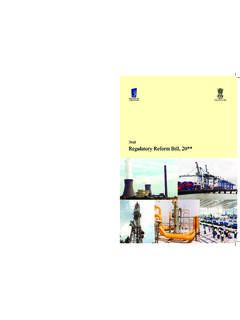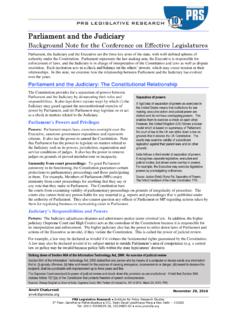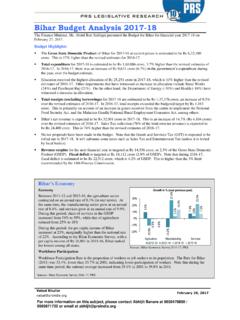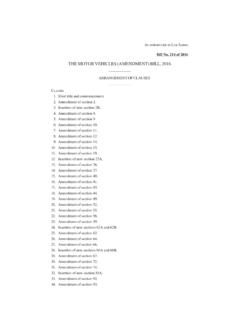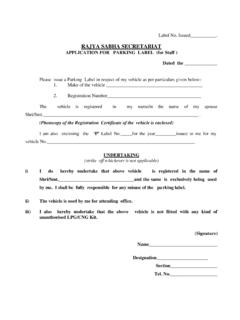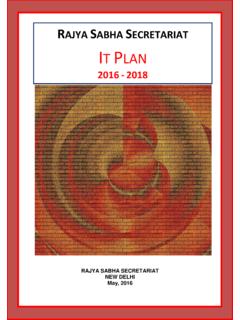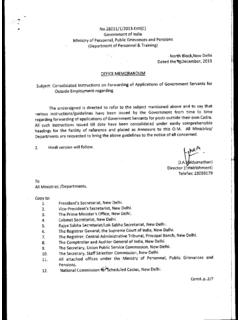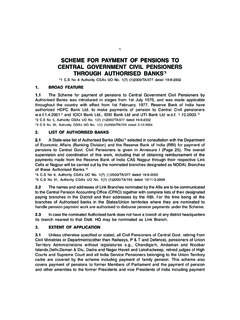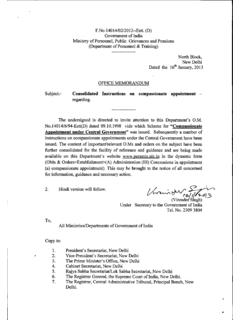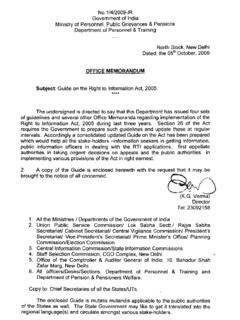Transcription of Parliamentary Procedures: A Primer - PRS | Home
1 Parliamentary procedures A Primer rajya sabha Apoorva Shankar and Shreya Singh January 2015 PRS Legislative Research Institute for Policy Research Studies 3rd Floor, Gandharva Mahavidyalaya 212, Deen Dayal Upadhyaya Marg New Delhi - 110 002 Tel: (011) 43434035-36, 23234801-02 DISCLAIMER: This document is being furnished to you for your information. You may choose to reproduce or redistribute this report for non-commercial purposes in part or in full to any other person with due acknowledgement of PRS Legislative Research ( PRS ). The opinions expressed herein are entirely those of the author(s). PRS makes every effort to use reliable and comprehensive information, but PRS does not represent that the contents of the report are accurate or complete. PRS is an independent, not-for-profit group.
2 This document has been prepared without regard to the objectives or opinions of those who may receive it- 1 - Introduction Parliament is the highest law making body in the country. In addition to its legislative function, it keeps a check on the functioning of the government and passes the country s budget. As a representative institution, it also highlights important issues being faced by the people. These four responsibilities have been entrusted to both Houses of Parliament by the Constitution. The fulfilment of this mandate is dependent upon the effective participation of Members of Parliament (MPs) in its proceedings. Parliament as an institution works in a structured manner. Both Houses of Parliament have detailed Rules of Procedure which regulate their functioning.
3 For effective participation in Parliamentary proceedings, advance preparation and an understanding of the Rules is important. The purpose of this Primer is to assist newly elected rajya sabha MPs in navigating the Rules of Procedure of the rajya sabha . It has been organised in a manner that highlights the opportunities for participation in rajya sabha on a typical day. Each section provides an overview of the Rules and explains the procedural requirements that need to be followed. - 2 - rajya sabha : An Overview rajya sabha s proceedings are presided over by the Chairman of the House. The proceedings are guided by the Rules of Procedure, which are implemented by the Chairman. The Rules give the Chairman discretion in some matters to ensure smooth functioning of the House.
4 For example, the discretion to allow an MP to raise a matter of public importance rests with the Chairman. In the Chairman s absence, the Deputy Chair or the Panel of Chairmen presides over the House. The functioning of the rajya sabha is co-ordinated by the rajya sabha Secretariat. Each morning, MPs receive a packet containing information about the day s agenda and a summary of the previous day s proceedings. rajya sabha begins work at 11 am and is scheduled to work till 6 pm. Rules provide a break for lunch from 1 pm to 2 pm. The House can work through the lunch break and beyond 6 pm if the MPs agree to do so. Its proceedings can also be wound up before 6 pm at the direction of the Chairman. The pre-lunch proceedings of the rajya sabha include the Zero Hour and Question Hour. During this period MPs participate in the proceedings as individual legislators, independent of the political ideology of their parties.
5 Post lunch the House meets for government business. This includes debates on national issues, passing laws, budget etc. In these proceedings, MPs act as representatives of their political parties. The government business of the House is regulated by a committee called the Business Advisory Committee. It is chaired by the Chairman and comprises leaders of political parties in the House. It decides the business that would be taken up in the week and allocates time for each debate. - 3 - Usually, the time allocated for debate is then distributed between the political parties depending on their strength in the House. The party leadership decides the names of the MPs who would speak in each debate. Participation in the proceedings of the House often requires advance planning. Rules require that MPs give prior information to the Secretariat/Chairman for asking questions, raising issues, and initiating or participating in debates.
6 This is called giving notice . For example, to ask a question in the House, a notice of fifteen days is required. There is some flexibility in the Rules to allow for debates without giving prior notice. This is left at the discretion of the Chairman. Annexure 1, at the end of the document, contains a table summarising the requirements of giving notice for participating in different debates of the House. The rajya sabha also takes decisions on various issues through questions posed in the form of motions. The motion is then voted upon by MPs present in the House. Typically, the voting is done orally with MPs supporting the motion saying aye and those opposing the motion saying no. The motion is accepted if the Chairman is of the opinion that more MPs were in favour of the motion. MPs also have the option of asking the Chairman to hold a recorded vote which is called a division.
7 The voting is then held electronically with MPs pressing buttons at their seats to express their support or opposition to a motion. - 4 - Figure 1: A Day in Parliament 1. Zero Hour The Zero Hour is usually used to raise matters that are urgent and cannot wait for the notice period required under other procedures . For raising matters during the Zero Hour, MPs give notice before 10 am to the Chairman on the day of the sitting. The notice must state the subject they wish to raise in the House. The Chairman decides whether to allow the matter to be raised. Short notice questions too are taken up during the Zero Hour. Laying of Papers: During this time, various papers such as annual reports of ministries, public sector undertakings, government bodies, audit reports by the CAG, government notifications, etc.
8 Are also laid on the table of the House. - 5 - 2. Question Hour While Question Hour used to be the first hour of sitting in the rajya sabha , starting with the 2014 Winter Session, it will be held from 12 pm to 1 pm. This is used by parliamentarians to hold the government accountable for its actions. Facts relating to policies, etc. can be questioned and Ministers are answerable for their Ministry s actions. What are the different types of questions? There are three different types of questions - starred, unstarred and short notice questions. Starred Question: A starred question is asked by an MP and answered orally by the Minister-in-charge. MPs are allowed to ask one starred question each, in one sitting. Starred questions are submitted in advance (15 days) and only 15 questions are picked (through ballot) for oral answer on a day.
9 The questioning MP can thereafter ask upto two supplementary questions. Three other MPs can then ask supplementary questions based on the Chairman s discretion. - 6 - Preparing for a Starred Question Since the answer to a starred question can be followed by supplementary questions, they are better used when asking about the government s views and policy inclination. Supplementary questions can be used to get answers on issues that the government may not have explained in its reply to the question. The list of starred questions is available three days in advance. This provides MPs with the opportunity to prepare for supplementary questions, even on questions listed against the names of other MPs. Typically, 5-6 questions are answered in the one hour allocated for Question Hour. Therefore, it may be preferable to focus on the first few questions while preparing supplementaries.
10 Preparing for an Unstarred Question Unstarred questions do not allow for follow-up questions. This is why they are more conducive for getting answers on queries related to data/information. Unstarred Question: An unstarred question receives a written reply from the Ministry. They are submitted 15 days in advance. A maximum of 160 unstarred questions are picked for a day. An MP can submit seven questions on a day. If chosen by the ballot, he can ask a maximum of five questions, of which only one can be a starred question. - 7 - Short Notice Question: These relate to a matter of urgent public importance. They can be asked with less than 15 days notice. Like starred questions, short notice questions are answered orally followed by supplementary questions. These are admitted at the discretion of the Chairman.
